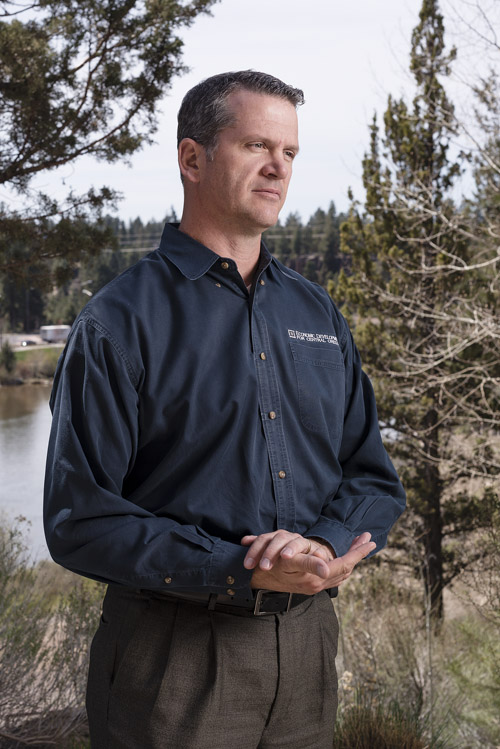 BY COURTNEY SHERWOOD
BY COURTNEY SHERWOOD
Business and civic leaders weigh the risks and rewards of going green.
BY COURTNEY SHERWOOD | PHOTOS BY JASON KAPLAN*
*ROGER LEE PHOTO BY JOE KLINE; ALLYN FORD PHOTO BY ROBIN LOZNAK
 When we want to hear about the state of Oregon’s green economy and where it’s headed, we often turn to people who think about sustainable business practices for a living: the CEOs and innovators heading up clean-tech companies, the sustainability directors at large corporations and policy experts at eco-nonprofits. But the state faces environmental risks — and economic opportunities — that go far beyond these usual suspects. So we took a slightly different approach to the subject by turning to the power players: the men and women shaping public policy and building the business strategies that define Oregon’s economy. A few of the people we interviewed might be considered environmental leaders (Gov. Kitzhaber, for example). The majority, including financial manager Charles Wilhoite, are not. Here is a sampling of the questions we asked: What would it mean for Oregon to have a green economy? What’s the appropriate balance between policy action and private-sector leadership? How important is it for Oregon to be a national environmental leader from an economic point of view? Are we maintaining or bolstering our reputation?
When we want to hear about the state of Oregon’s green economy and where it’s headed, we often turn to people who think about sustainable business practices for a living: the CEOs and innovators heading up clean-tech companies, the sustainability directors at large corporations and policy experts at eco-nonprofits. But the state faces environmental risks — and economic opportunities — that go far beyond these usual suspects. So we took a slightly different approach to the subject by turning to the power players: the men and women shaping public policy and building the business strategies that define Oregon’s economy. A few of the people we interviewed might be considered environmental leaders (Gov. Kitzhaber, for example). The majority, including financial manager Charles Wilhoite, are not. Here is a sampling of the questions we asked: What would it mean for Oregon to have a green economy? What’s the appropriate balance between policy action and private-sector leadership? How important is it for Oregon to be a national environmental leader from an economic point of view? Are we maintaining or bolstering our reputation?
Not everyone wanted to participate. The Standard offered up a spokesman but declined a request to talk to CEO Gregory Ness. Nike said no to any interviews with company officials. Intel, which recently revealed it has been unknowingly emitting fluoride air pollution in Hillsboro for decades, declined our interview request but sent us documents about the company’s sustainability efforts
But many leaders did agree to talk. We interviewed Gov. Kitzhaber, Portland’s mayor, the heads of companies such as PGE and Roseburg Forest Products, the president of the University of Oregon and leaders of major industry groups.
Here are five lessons gleaned from those conversations.
LESSON 1: It’s risky for Oregon to act alone.
Oregon businesses pride themselves on the voluntary steps they’ve taken to become green. But when it comes to new environmental regulations, business gets nervous.
 |
| James Piro, president and CEO, Portland General Electric |
James Piro, president and CEO of Portland General Electric, says PGE’s investments in wind and solar energy projects have the utility on track to obtain 25% of its energy from renewable sources by 2025 — as required by state law. To recognize the costs to the planet of carbon emissions, PGE includes a carbon price in its internal calculations when comparing fossil fuels to other energy sources. Piro says his company is a national leader on green issues. Yet he opposes the idea of new regulations aimed at reducing carbon emissions — especially if Oregon acts alone.
“We are making the right decisions already,” Piro says. “I’m not a proponent of any type of carbon pricing. All it would do is raise prices for consumers without changing results. They are already paying a higher price for the product they buy because we have made it greener.” Piro believes that Oregon-specific or Western-U.S. climate regulations would put businesses in the region at a competitive disadvantage. “We are especially not a proponent of local carbon pricing. If it’s going to be done, it has to be national.”
Ryan Deckert, president of the Oregon Business Association, likewise worries that new regulations could do more economic harm than environmental good. His nonpartisan statewide business group advocates for 500 companies spread across Oregon; recent priorities have included boosting academic achievement to improve the workforce and investing in transportation infrastructure.
 |
| Ryan Deckert, president, Oregon Business Association |
“Precision Castparts, Blount, Greenbrier — companies like these are at the core of the middle-class economy in Oregon,” Deckert says. “Let’s keep our eye on the ball, ensuring that good decisions are made for their growth.” In 2013 Precision Castparts ranked No. 1 on a University of Massachusetts list of the nation’s most toxic polluters, but the company also employs more than 2,300 people in Portland. Deckert is wary that too much regulation could chase away employers like these “to the extent that 100, 200 jobs leave Oregon because Daimler can more profitably do things in North Carolina.”
Sandra McDonough, president and CEO of the Portland Business Alliance, sees an appropriate role for environmental regulations but opposes region-by-region legislation. “We would be concerned about practices that are Portland specific,” she says. “It doesn’t make sense for businesses in Portland to face costs and regulations that other businesses don’t. Businesses would not want to locate here, because cost is a factor in decisions they make.”
McDonough, Deckert and others do argue that global and national action are needed to successfully address climate change. They celebrate Oregon’s status as a green leader but oppose state-specific regulations aimed at addressing global environmental challenges. Even the governor, recognized for his support of environmental legislation — seems caught by this tension. “It is important that we be able to show that the quality of our air and the quality of our water is improving, and that we continue to find ways to build on our clean-economy successes to date,” Kitzhaber says. But in his second term, the governor’s environmental priorities have often taken a backseat to health care and education. And beyond opposing Pacific Northwest coal exports and advocating for clean fuels, he has focused on broader collaborations, such as the Pacific Coast Action Plan, an agreement signed last year by four governors to put a price on carbon emissions and promote clean energy.
LESSON 2: It’s hard to get incentives right.
 |
| Roger Lee, executive director, Economic Development for Central Oregon |
“I’m not typically an advocate of the government telling us what to do,” says Roger Lee, executive director of Economic Development for Central Oregon. A regional economic development agency, Bend-based EDCO uses its knowledge of tax incentives, real estate opportunities and business fundamentals to support business growth in Central Oregon. It has named renewable-energy development as one of seven industry sectors it is targeting. Excess regulation can drive out businesses, Lee says, whereas the right incentives can more effectively change behavior. “I’m a fan of the carrot, not the stick.”
But he warns that it’s hard to get industry-targeted incentives right. Lee points to the controversial Business Energy Tax Credit program, which gave away millions of dollars in green-business-focused tax subsidies but yielded little measurable result. In fact, a 2010 Oregonian investigation revealed several abuses of the BETC program: Walmart netted an $11 million profit by trading energy tax credits without making green investments; an ethanol plant got $12 million in tax subsidies, then declared bankruptcy and shut down; a Boardman business got $3.4 million to support tire recycling — even though it did not recycle tires. “BETC is a good example of an experiment that could have set us back, in terms of economic development policy,” Lee says.
 |
| Portland Mayor Charlie Hales |
Yet the Northwest Food Processors Association, a Portland-based trade group that advocates for food manufacturers in Oregon, Washington and Idaho, would like to see the return of BETC-like credits. “Many of our members used the Business Energy Tax Credit to make environmental improvements,” says Pam Barrow, director of energy and sustainability at the group. “It got out of hand, but legislative reforms were far too cumbersome. A program like BETC can help companies overcome barriers to making environmental improvements. Businesses already need to be in compliance with regulations, but with the right incentives, many companies will go beyond ‘compliance.’”
Charles Wilhoite, who has examined the finances and business choices of companies across the U.S. as managing director of Portland-based Willamette Management Associates, says his views on incentives are colored by his experiences on the Portland Development Commission and the board of the Nature Conservancy — although he did express surprise at being contacted for a story on “green business.” Subsidizing and actively recruiting environmentally focused businesses comes with political risks, he says. Not every startup will succeed, and when a taxpayer-backed solar business goes bust, skeptics are quick to cry foul. But Wilhoite believes these politically risky incentives can pay off over time. “Whether it’s battery innovations, renewables, electric cars, wind and solar businesses, we have seen opportunities and we are trying to encourage growth across the state,” he says. “To motivate businesses to drop anchor in the region, or to expand here, there have to be incentives.”
 |
| Pam Barrow, director of energy and sustainability, Northwest Food Processors Association |
Deckert at the Oregon Business Association says he agrees in principle that incentives can play a crucial role in supporting risky yet vital business investments. But he also believes that green incentives should not come at the expense of other economic-development efforts. “We have other clusters. Advanced manufacturing is taking off in the state. We have huge workforce needs. We are building the next ships, airplanes, exporting products, and we can’t find qualified workers in the state of Oregon. That’s a big deal, and we need to make sure we don’t lose sight of that when we focus on green-business incentives.”
In short: there’s consensus that incentives can be an effective way to boost green investments and encourage environmental decision making — but little agreement on which incentives work best.
LESSON 3: The market is already rewarding green practices.
 |
| Sandra McDonough, president and CEO, Portland Business Alliance |
Despite opposition to new regulations and disagreement on incentives, many companies have found that the marketplace is already pushing them to adopt environmental practices.
When asked what “green business” means, Portland Mayor Charlie Hales reels off a list of textile designers and building companies. He cites Neil Kelly remodelers, founded in 1947, which has become a national leader in alternative-energy and sustainably focused home remodels, and property developer Gerding Edlen, which touts the principles of “People, Planet, Prosperity” on its website. Hales shows off his iPad case, made by Looptworks out of other manufacturers’ scraps. Today Portland’s reputation as an environmental leader helps attract talented employees and bolsters the city’s economy, Hales says. But many of the city’s green businesses became market leaders simply by pursuing economic opportunities. “A lot of what businesses are doing now qualifies as green, but we weren’t always thinking about saving the planet when we got started,” he says.
While some Oregon businesses have pursued market opportunities and then been labeled “green” after the fact, others are just beginning to see the financial benefits of environmental practices.
Skip Newberry, president of the Technology Association of Oregon, says green policy issues are not on his radar. “We haven’t posed those questions,” he says, when asked how his members feel about incentives and regulation. But the high-tech companies he works with are thinking about energy use and sustainability within their own operations. “There’s a broad look at environmental footprint among a lot of tech companies,” Newberry says. “There’s an economic reason for this: It’s good marketing, good PR. Some say being good stewards of the environment can be good for retention and recruiting top talent. And operational efficiencies can save resources and be good for business.”
 |
| Skip Newberry, president, Technology Association of Oregon |
And it’s not just high-tech firms that see the financial logic of adopting environmental practices. The Portland Business Alliance, which acts as a chamber of commerce for 1,700 companies in the metro area, draws crowds of business owners looking to learn from one another at its quarterly Green Bag Lunch events, says McDonough, PBA president. “There’s the ethic of wanting to be environmentally sustainable, and these practices make business sense.”
Even forest-products companies — which have a long history of clashing with environmentalists — say market forces are spurring them to become greener.
That’s the case at Roseburg Forest Products, which CEO Allyn Ford says has adopted an increased focus on sustainable business practices. The family-owned, Roseburg-based company was founded in 1937, a time when Oregon’s natural resources seemed limitless, and quickly grew to become one of the region’s largest private wood-products manufacturers. Today Roseburg Forest Products employs more than 3,000 people in six states. It owns private timber lands and sells lumber and manufactured-wood products. The company has come to understand that its future depends on responsible use of resources, Ford says. It offers one of the largest and most diverse selections of green building products in North America. “We have a relationship with the land, and that involves a commitment to good management of the forest and commitment to the land itself.”
LESSON 4: Antagonism between businesses and environmentalists is declining.
 |
| Allyn Ford, CEO Roseburg Forest Products |
Roseburg’s embracing of green marketing opportunities illustrates just how far Oregon’s environmental conversation has progressed. In the 1990s, eco-activists were spiking trees and setting firebombs to fight logging in this state. In the early 2000s, guards wore Kevlar vests to protect themselves from crowds angry about water conflicts in Southern Oregon. Today environmentalists have calmed down, and many businesses have embraced their messages — or are even driving green policy.
“Working on environmental policy is not a smooth process; there’s still a lot of debate,” Ford says. Loggers want access to burned timber on federal lands scarred by last year’s wildfires, for example. Environmentalists want more restrictions on timber-company pesticides. “But our governor and his administration have provided a forum for us to work together toward compromises.”
Not every corporate proposal is winning environmentalist support — but businesses increasingly fall on both sides of these disputes. Battles over fossil fuels have especially divided the business community, with high-tech and clean-energy businesses often siding with environmentalists. Nine Oregon companies joined 200 businesses that wrote to the Obama administration opposing the Keystone XL Pipeline in March. Among them: 3E Strategies, an environmental consulting firm owned by Gov. Kitzhaber’s girlfriend, Cylvia Hayes, and AmeriStar Solar, which develops portable solar-power systems for the armed forces.
The University of Oregon, an early adopter of environmental policies and research, has a front-row view of businesses’ growing environmentalism. “It’s undeniable that sustainability is becoming an ever-bigger aspect of our national economy and our regional economy,” says university president Michael Gottfredson.
 |
| Michael Gottfredson, president, University of Oregon |
Gottfredson touts UO’s environmental studies program, with 500 students enrolled, and its environmentally focused law and architecture degree options. Increasingly, however, businesses are interested in more than just the workers that the university produces — they want to learn from faculty. Chemistry research into raw materials, for example, has drawn the interest of companies making products that consumers don’t hold on to. Used gadgets are filling landfills and creating waste-disposal nightmares — and businesses want access to research that will help develop products that cause less environmental harm.
“The sustainability movement is a huge business proposition,” Gottfredson says. “There is value-added synergy when we bring businesses and environmental opportunities together.”
LESSON 5: No disruption.
 |
| Charles Wilhoite, managing director, Willamette Management Associates |
Some of the biggest corporate success stories in recent years have involved disruptive technology — from Amazon.com’s shakeup of book publishing to Airbnb’s sharing-economy innovations. But if “disruption” is a hot topic at business schools and in many industry sectors, the mainstream rhetoric around green business policy is decidedly incremental. In Oregon today, business leadership is driving green policy as never before — but by betting less on a great leap forward than on a slow build.
Not surprisingly, the business and political leaders we talked to say going green makes economic sense. Cutting waste cuts costs and can boost the bottom line, consumers are rewarding businesses that adopt environmental policies, and sustainable practices can help employers with recruitment and retention of highly skilled workers. In short, market forces are spurring businesses to go green without the cudgel of regulation. A few decades ago, businesses and environmentalists often seemed locked in permanent opposition, but today many businesses are siding with eco-warriors — and asking sustainability experts for help.
 |
| Governor John Kitzhaber |
No bold proclamations or unified policy prescriptions emerged from our interviews, although Gov. Kitzhaber came close. “A green economy means that we are not spending our children’s natural capital — their lands, waters and clean air — and that our economy is operating on a long-term sustainable basis,” he says. “Oregon businesses already lead on so many fronts in the sustainable economy. The business community can and should lead on these issues, as there is a major competitive opportunity here, and the state should look for ways to support these efforts.” Gov. Kitzhaber says the state should “accelerate the transition to a sustainable clean economy.” He supports a state law passed in 2009 aimed at improving access to alternatives to gasoline. And he’s called for a number of studies and examinations into environmental challenges facing the state’s farmers and foresters.
Mayor Hales says Portland’s urban planning is guiding environmental business decisions, but he’d like more funding. Gottfredson says the University of Oregon is a leader in sustainability — and he wants more state money too. In the business community, Deckert, McDonough, Lee, Ford and Newberry prefer to highlight the ways many companies are already making sustainable choices, and shy away from talk of legislation. Finding the right incentives could spur more companies to go green, Barrow says, but it’s hard to agree on just what those incentives should look like.
So as environmentalists seek action, as policymakers proclaim the value of green business but hesitate to act aggressively, Oregon businesses continue to explore the bottom-line benefits of going green. The leaders we interviewed aren’t trying to disrupt the market — yet market-driven decision makers continue to crowd Green Bag Lunch events. Bit by bit, Oregon businesses are cutting waste and energy, developing clean-tech and alternative-energy innovations, and changing the status quo.
“Not to diminish politicians,” says PGE’s Piro, “But politicians work on policy; real companies work on real problems.”


